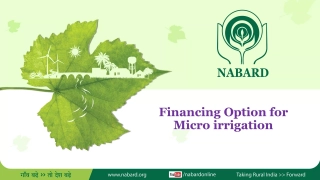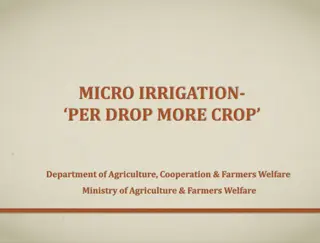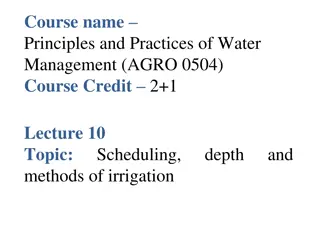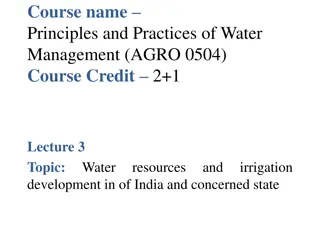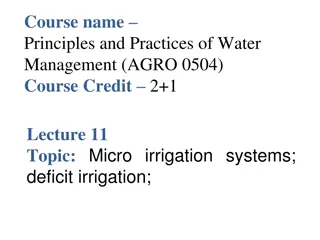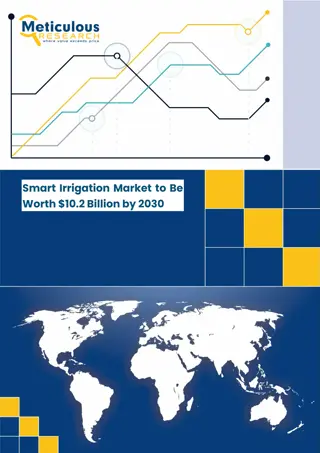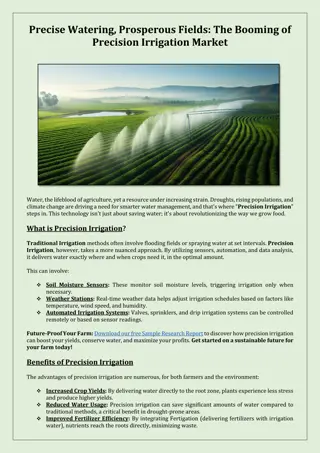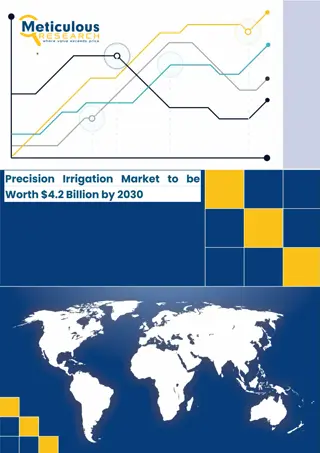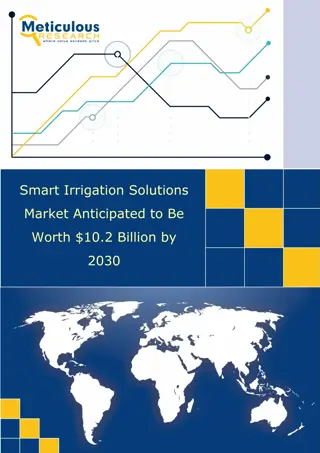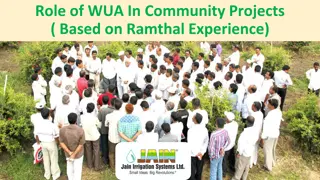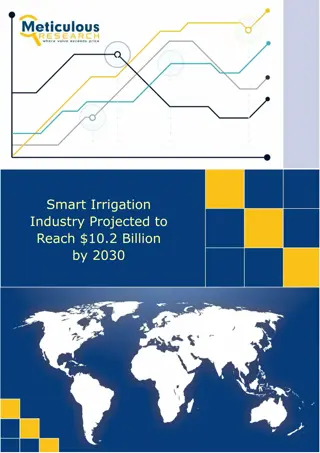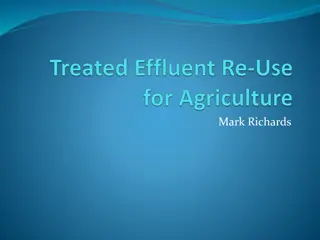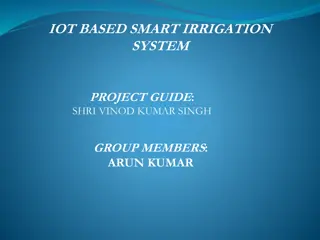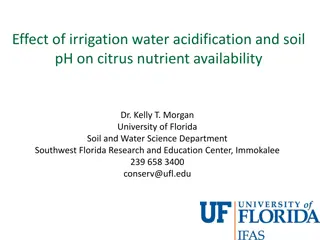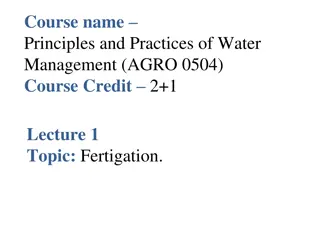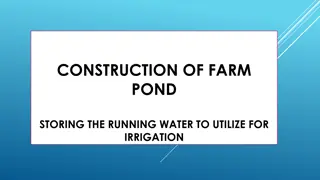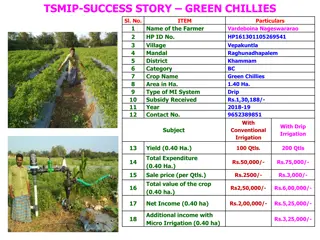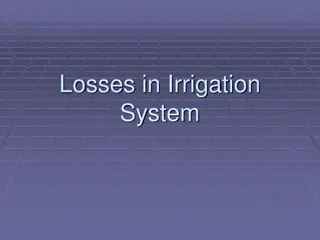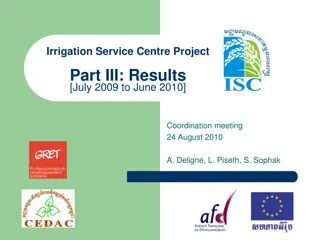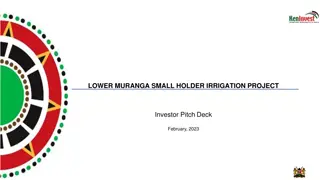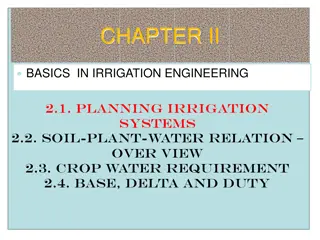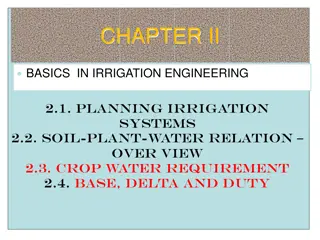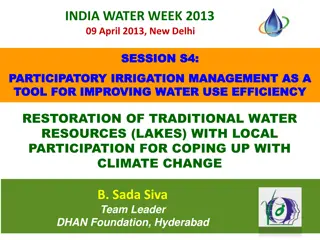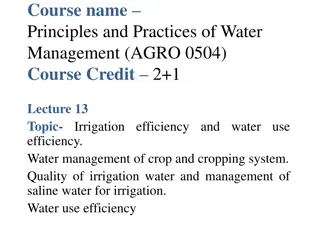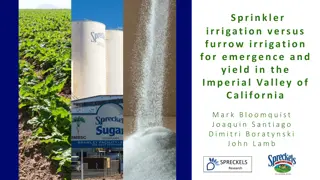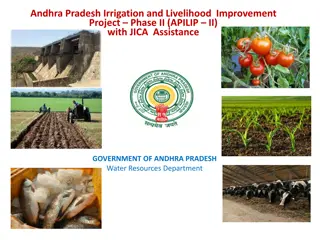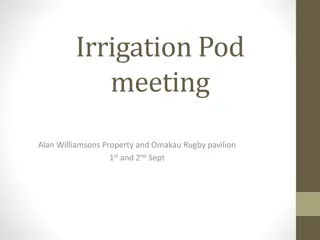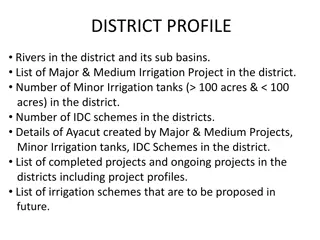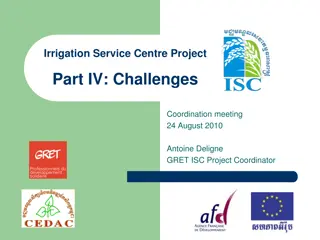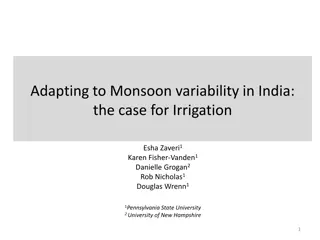Financing Option for Micro irrigation
Explore the financing options available for micro irrigation in India, including loans, subsidies, and funds provided by the government and financial institutions. Learn about the potential areas for micro irrigation and the progress made so far.
1 views • 10 slides
Tradeoffs Between Water Savings and GHG Emissions in Irrigated Agriculture
This study examines the tradeoffs between water savings, economic impact, and greenhouse gas emissions resulting from technological changes in the irrigation industry. Key objectives include estimating water savings for different crops, quantifying GHG emissions from new irrigation technologies, and
0 views • 24 slides
Primer on Major, Medium, and Minor Irrigation Projects in India
Explore the classification and methods of major, medium, and minor irrigation projects in India, including direct and indirect irrigation methods, gravity flow schemes, and lift irrigation systems.
1 views • 28 slides
Micro Irrigation for Increased Crop Yield and Water Efficiency: Insights and Best Practices
Explore the impact of micro irrigation in agriculture, highlighting the Department of Agriculture's efforts to promote water-efficient farming practices. Discover patterns of micro irrigation adoption, successful state initiatives, and the benefits of drip irrigation in terms of cost, yield, and wat
0 views • 10 slides
Micro Irrigation Progress and Growth in Rajasthan
The Department of Horticulture in Rajasthan is making significant strides in micro irrigation, aiming to cover a vast potential area. With a focus on improving irrigation efficiency and expanding coverage, the state shows promising growth trends in the adoption of micro irrigation systems. The progr
1 views • 18 slides
Understanding Irrigation Scheduling for Optimal Crop Yield
Scientific irrigation scheduling plays a vital role in determining the correct timing and quantity of water application for crops to enhance yields efficiently while preserving soil quality. Various criteria are utilized in irrigation scheduling, such as potential evapotranspiration (PET) estimation
13 views • 58 slides
Principles and Practices of Water Management in India: Irrigation Projects and Methods
This course delves into the principles and practices of water management in India, focusing on water resources, irrigation sources, major, minor, and medium irrigation projects, and various irrigation methods adopted in the country. It covers the classification of irrigation projects based on covera
7 views • 7 slides
Principles and Practices of Micro Irrigation Systems
Explore the world of drip irrigation, a precise and efficient method of watering crops. Originating in Israel in 1964, drip irrigation is widely adopted in regions with water scarcity and salt issues. This system enables controlled water application to a variety of crops, increasing yield and conser
4 views • 23 slides
Comprehensive Guide to Continuous Bladder Irrigation (CBI)
Explore the essential information about Continuous Bladder Irrigation (CBI), including its procedure, indications, supplies and equipment needed, documentation guidelines, and monitoring protocols. Learn about the importance of CBI in post-prostate surgery, urinary tract obstruction prevention, clot
5 views • 14 slides
Principles and Practices of Water Management: Fertigation in Controlled Environments
Fertigation is a cultivation method where complete fertilizer is delivered to crops in solution form through drip irrigation. Basic requirements include greenhouses, drip irrigation systems, clean water supply, pH and EC adjustment tools, and suitable nutrient concentrations. Effective water managem
4 views • 10 slides
Smart Irrigation Market - Global Opportunity Analysis And Industry Forecast (202
Smart Irrigation Market by Type (Weather Based, Soil Moisture Based) Component (Monitoring, Controlling, Connectivity, Software), Irrigation Type (Sprinkler, Drip, Surface, Pivot), End Use, and Geography - Global Forecast to 2030\n
4 views • 4 slides
Precise Watering, Prosperous Fields: The Booming of Precision Irrigation Market
The Global Precision Irrigation Market is on a steady rise. According to the BIS Research, estimates suggest a current size of around $2,238.7 Million in 2022, with a projected Compound Annual Growth Rate (CAGR) of 14.84% reaching $4,471.2 Million by 2027 during the forecast period 2022-2037.
0 views • 2 slides
Precision Irrigation Market to be Worth $4.2 Billion by 2030
Explore $4.2 billion precision irrigation market: Get exclusive insights on key market trends, segments, geographical analysis, & competitive analysis!\n
0 views • 4 slides
Smart Irrigation Solutions Market Anticipated to Be Worth $10.2 Billion by 2030
Meticulous Research\u00ae projects the smart irrigation market to reach $10.2 billion by 2030, with a compound annual growth rate (CAGR) of 22.4% from 2023 to 2030.\n
0 views • 4 slides
Enhancing Community Projects Through Water User Associations (WUA) in Ramthal Experience
The role of Water User Associations (WUAs) in community projects, such as irrigation schemes, plays a vital role in improving service delivery, ensuring reliable water supply, reducing losses, and enhancing productivity. By implementing Public-Private Partnerships (PPP) in irrigation, better results
0 views • 13 slides
Smart Irrigation Market
Discover the $10.2 billion smart irrigation market: Gain exclusive insights into essential market trends, segments, geographical analysis, and competitive landscape.
0 views • 3 slides
Comprehensive Guide to Irrigation in Agriculture
Irrigation plays a crucial role in agriculture, enhancing crop quality, increasing yields, and driving global food production. This guide covers the benefits, needs, and water quality-related problems associated with irrigation in agriculture, emphasizing its importance in sustaining food supply and
5 views • 14 slides
IoT Based Smart Irrigation System Project Guide
Monsoon-dependent Indian agriculture can benefit from an automatic irrigation system that prevents both over- and under-irrigation. By leveraging wireless technology, such as sensors for soil moisture, air humidity, temperature, and water levels, this project aims to optimize crop production by savi
4 views • 14 slides
Efficient Fertigation Practices for Improved Crop Yield
Enhance your crop yield with efficient fertigation practices outlined by Lyndon Kelley, an irrigation management agent at MSU Extension and Purdue University. Understand the key aspects of fertigation planning, including matching N uptake curves, optimizing N source availability, and utilizing irrig
0 views • 8 slides
Understanding Citrus Nutrient Availability in Relation to Soil pH and Irrigation Water Acidification
This research by Dr. Kelly T. Morgan from the University of Florida explores the impact of soil pH, irrigation water acidification, and nutrient recommendations on citrus trees affected by HLB disease. The study examines the availability of key nutrients such as Mn and Zn, the effects of different s
0 views • 23 slides
Principles and Practices of Water Management: Fertigation System Overview
Fertigation, a fusion of "fertilizer" and "irrigation," revolutionizes crop cultivation by delivering complete fertilizer solutions to root zones through drip irrigation systems. This method, crucial in controlled environments like greenhouses and polyhouses, requires specific infrastructure, clean
0 views • 10 slides
Constructing Farm Ponds for Water Harvesting and Irrigation in Rural Areas
Proper water harvesting is essential for agricultural sustainability in rural areas. Farm ponds serve as reservoirs to store runoff and running water from natural sources, aiding in irrigation and fish production. The construction of a farm pond in Gram Panchayat Dulmot has significantly benefitted
0 views • 5 slides
Micro Irrigation Success Stories: Green Chillies, Chrysanthemum, Marigold, Cabbage
Discover the success stories of farmers implementing micro irrigation systems in cultivating green chillies, chrysanthemum, marigold, and cabbage. These stories showcase increased yields, improved profits, and enhanced sustainability through the adoption of drip irrigation systems.
0 views • 8 slides
Understanding Losses in Irrigation Systems: Measurement Methods and Techniques
Losses in irrigation systems, including seepage and evaporation, are major concerns impacting water conservation. This article discusses historical estimates of losses, types of losses (seepage and evaporation), methods used to measure losses (direct and indirect), and detailed information on seepag
6 views • 29 slides
Planning of Surface Irrigation Systems in Agricultural Structures: A Comprehensive Guide
Planning and implementing surface irrigation systems, such as basin irrigation and furrow irrigation, play a crucial role in optimizing water distribution for agricultural purposes. This article delves into the detailed planning considerations for basin irrigation systems, including sizing of basins
1 views • 10 slides
Irrigation Service Centre Project Results 2009-2010
Results and progress updates of the Irrigation Service Centre Project from July 2009 to June 2010 are outlined, including objectives achieved, areas of work, and schemes supported by the project in Kompong Thom. The establishment of a service center, service development, and collaboration efforts ar
0 views • 9 slides
Lower Muranga Small Holder Irrigation Project Investor Pitch Deck
Agricultural sector crucial for Kenya's economy. Proposed irrigation project aims to boost farm output, food security, and economic growth. Seeking investors for $102.5 Mn investment in irrigation and hydropower infrastructure across Muranga catchment area. Projected positive NPV and IRR, benefiting
0 views • 12 slides
Basics of Planning Irrigation Projects in Engineering
Planning irrigation projects involves defining project activities, goals, resources, and constraints to establish a logical framework for management and evaluation. This process includes estimating project size, technical scope, resources required, scheduling, risk assessment, and negotiation. A pro
1 views • 22 slides
Basics of Crop Water Requirements in Irrigation Engineering
Understanding crop water requirements is crucial in planning effective irrigation systems. Crop water requirements are determined by factors such as evapotranspiration, soil conditions, and achieving maximum production potential. Effective rainfall, soil moisture storage, and groundwater contributio
0 views • 83 slides
Participatory Irrigation Management for Improved Water Use Efficiency and Climate Change Adaptation
DHAN Foundation in Hyderabad is implementing participatory irrigation management for enhancing water use efficiency and restoring traditional water resources like lakes with local participation. The focus is on conservation and development of traditional irrigation tanks to promote livelihoods, maxi
0 views • 11 slides
Wireless Soil Moisture Tension Measurements for Irrigation Management
High-density, multiple-depth wireless soil moisture tension measurements were conducted in a vineyard in Napa Valley. The study found correlations between soil moisture tensions and leaf water potential, offering valuable insights for irrigation management. Utilizing a wireless sensor network, the s
0 views • 16 slides
Principles and Practices of Water Management in Agricultural Cropping Systems
This course delves into the principles and practices of water management in agricultural cropping systems, focusing on topics such as irrigation efficiency, water use efficiency, crop and cropping system water management, and quality of irrigation water. It explores how assured irrigation water faci
0 views • 16 slides
Optimizing Surface Irrigation Systems for Farm Production
In the field of ZRAAT FAKLTES, the planning and implementation of surface irrigation systems play a crucial role in enhancing farm production and profitability. Various simulation programs like TYS-624 are utilized for optimizing surface irrigation methods. Assumptions regarding crop root system, in
0 views • 8 slides
Comparative Study of Sprinkler Irrigation vs. Furrow Irrigation for Sugar Beet Production in Imperial Valley, California
This research project in the Imperial Valley, California, compares the effectiveness of sprinkler irrigation and furrow irrigation on sugar beet emergence and yield during the production season. Through field surveys and data analysis, the study aims to determine the impact of irrigation methods on
0 views • 25 slides
Andhra Pradesh Irrigation and Livelihood Improvement Project Phase II Overview
Andhra Pradesh Irrigation and Livelihood Improvement Project Phase II (APILIP-II) is a project with JICA assistance aimed at increasing irrigated area, local productivity, and livelihoods of farmers in Andhra Pradesh. The project involves modernizing irrigation projects, promoting integrated farming
0 views • 23 slides
Success Story of Farming Development Through Irrigation
Journey of a farmer from Paerau to becoming a successful agriculture entrepreneur by utilizing irrigation to transform the family farm into a thriving business. The implementation of irrigation enabled the farm to diversify its operations, increase production, and ensure sustainability for future ge
0 views • 21 slides
Comprehensive Irrigation District Profile and Plans
This detailed document covers the district's rivers, irrigation projects, completed and ongoing projects, future proposals, and expectations from field staff. It also outlines the irrigation plan, project profiles, nodal officer details, and proformas for data submission. The emphasis is on validati
0 views • 7 slides
Rural Development Projects Update and Progress Report
Updates on ongoing rural development projects in Trissur, including completion targets, NRM activities, water harvesting initiatives, and utilization of funds towards District Irrigation Plan components. Emphasis on timely completion, evaluation of project teams, and the importance of community part
0 views • 21 slides
Challenges and Opportunities in Irrigation Service Centre Project Coordination
The Irrigation Service Centre Project faces challenges such as lack of functional schemes and financial capacities in Farmer Water User Committees (FWUC). Despite these obstacles, there are opportunities to make schemes partially functional with limited investments and engage farmers through members
0 views • 7 slides
Adapting to Monsoon Variability in India: The Case for Irrigation
This study explores the impact of monsoon variability on crop irrigation in India using an empirical model. It examines changes in crop irrigated areas in response to monsoon variations, focusing on rice, wheat, and sorghum. The research analyzes crop water needs, sensitivity to drought, and irrigat
0 views • 11 slides
